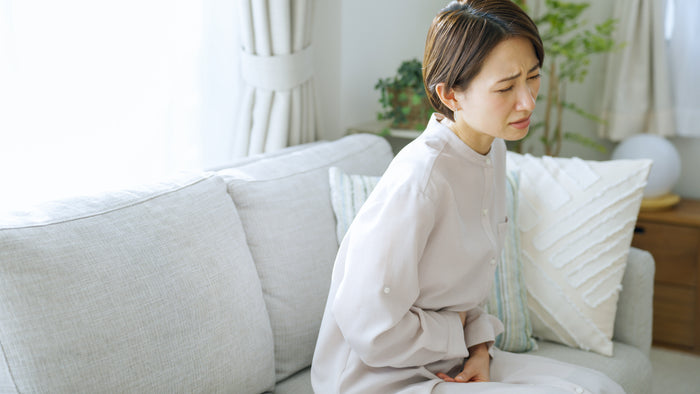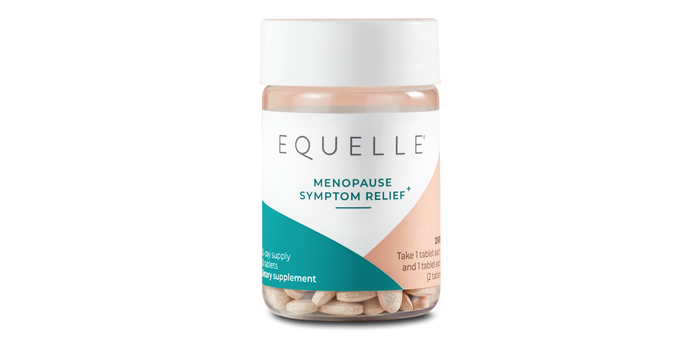You have no items in your cart
What Causes Irregular Periods?
Irregular periods are typically the result of a hormonal imbalance in the body.
Because hormones change significantly before, during, and after menopause, irregular periods are especially common as a woman ages.
Because hormones change significantly before, during, and after menopause, irregular periods are especially common as a woman ages.

Equelle Symptom Relief
The only estrogen decline symptom relief supplement with S-equol, a plant-based ingredient derived from soy that safely and naturally mimics estrogen - relieving hot flashes, improving sleep, and more.

Irregular Periods & How They Connect to Menopause
During perimenopause, the phase that precedes menopause, your ovaries are preparing to shut
down permanently.
Ovulation becomes erratic during this time, leading to unpredictable, irregular periods. In fact,
you may even notice that your cycle begins to disappear.
When you have not had a period for 12 consecutive months, you have reached menopause.
Irregular periods are the most common indication that you are in perimenopause. They are caused by fluctuating hormones. Your periods might become shorter or longer, heavier or lighter. Regardless, they will become less frequent over time until they stop entirely.
If the duration of your cycle changes by a week or more, you are probably in early perimenopause. If you are missing periods for a month or two, you may be in late perimenopause. Because you are ovulating less frequently, you are less fertile. However, it is important to remember that until you have had no period for at least 12 consecutive months, you are still ovulating and it is still possible for you to become pregnant. Unexpected pregnancies are more common when periods are irregular.
Irregular periods are the most common indication that you are in perimenopause. They are caused by fluctuating hormones. Your periods might become shorter or longer, heavier or lighter. Regardless, they will become less frequent over time until they stop entirely.
If the duration of your cycle changes by a week or more, you are probably in early perimenopause. If you are missing periods for a month or two, you may be in late perimenopause. Because you are ovulating less frequently, you are less fertile. However, it is important to remember that until you have had no period for at least 12 consecutive months, you are still ovulating and it is still possible for you to become pregnant. Unexpected pregnancies are more common when periods are irregular.

Other signs you may be entering menopause
Although irregular periods are the most common symptom of perimenopause, you can expect
these other complaints related to fluctuating hormones:
● Hot flashes
● Poor sleep quality
● Joint and muscle pain
● Difficulty concentrating
● Headaches
● Vaginal irritation
● Mood Swings
As a general rule, perimenopause does not require medical treatment. Many symptoms are completely manageable at home.
If you are concerned about what you are experiencing, however, please contact your healthcare provider.
● Hot flashes
● Poor sleep quality
● Joint and muscle pain
● Difficulty concentrating
● Headaches
● Vaginal irritation
● Mood Swings
As a general rule, perimenopause does not require medical treatment. Many symptoms are completely manageable at home.
If you are concerned about what you are experiencing, however, please contact your healthcare provider.
How to Manage Irregular Periods
While irregular periods are natural during perimenopause, they can cause a lot of distress and
confusion. Their unpredictability can disrupt day-to-day life, cause unwanted side effects, and
overall become a drain on quality of life.
To keep the consequences of irregular periods in check, consider making changes like:
● Keeping menstrual products handy. Half of the stress of dealing with irregular periods is feeling unprepared for them to come.
● Treating cramps and aches with heat. Find relief from the pain that often accompanies irregular periods with moisture and heat, like that of a heating pad or hot water bottle.
● Communicating with your support system. Seek out support from loved ones and healthcare professionals to navigate the emotions and frustration that can come with this phase of life.
● Maintain a routine as best as you can. Even if it won’t reset your cycle, a good routine makes it easier to take care of yourself and feel better equipped to handle whatever your body throws your way.
Some signs may indicate that your irregular periods are caused not solely by menopause, but potentially by other health conditions.
Be sure to contact your healthcare provider if you regularly experience any of the following:
● Periods that last longer than a week
● Extremely heavy periods that require a frequent change of pad or tampon
● Periods less than every 21 days
● Spotting between periods
● Bleeding after sex
To keep the consequences of irregular periods in check, consider making changes like:
● Keeping menstrual products handy. Half of the stress of dealing with irregular periods is feeling unprepared for them to come.
● Treating cramps and aches with heat. Find relief from the pain that often accompanies irregular periods with moisture and heat, like that of a heating pad or hot water bottle.
● Communicating with your support system. Seek out support from loved ones and healthcare professionals to navigate the emotions and frustration that can come with this phase of life.
● Maintain a routine as best as you can. Even if it won’t reset your cycle, a good routine makes it easier to take care of yourself and feel better equipped to handle whatever your body throws your way.
Some signs may indicate that your irregular periods are caused not solely by menopause, but potentially by other health conditions.
Be sure to contact your healthcare provider if you regularly experience any of the following:
● Periods that last longer than a week
● Extremely heavy periods that require a frequent change of pad or tampon
● Periods less than every 21 days
● Spotting between periods
● Bleeding after sex
Transitioning to Menopause
As you learn to cope with irregular periods, you’ll also likely be juggling other symptoms of
menopause as well. Transitioning into your new body is an ongoing process.
There are lots of things that can impact the onset of menopause, including lifestyle habits, genetics, and more.
No matter when it occurs, transitioning to menopause can be managed at home by:
● Eating a healthy diet with plenty of fruits, vegetables, healthy fats, and whole grains
● Including weight-bearing exercises in a regular fitness program
● Developing a bedtime routine that promotes healthy sleep habits
● Reducing or eliminating caffeine, nicotine, and alcohol
● Practicing stress management techniques
● Keeping a healthy weight
Transitioning to menopause doesn’t have to be difficult or scary.
There are lots of things that can impact the onset of menopause, including lifestyle habits, genetics, and more.
No matter when it occurs, transitioning to menopause can be managed at home by:
● Eating a healthy diet with plenty of fruits, vegetables, healthy fats, and whole grains
● Including weight-bearing exercises in a regular fitness program
● Developing a bedtime routine that promotes healthy sleep habits
● Reducing or eliminating caffeine, nicotine, and alcohol
● Practicing stress management techniques
● Keeping a healthy weight
Transitioning to menopause doesn’t have to be difficult or scary.

